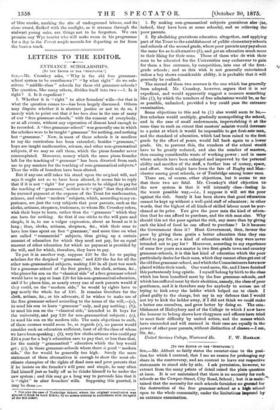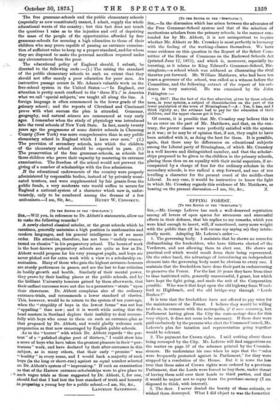[To Tim EDITOR Or TEl "SPROTITOS:1
SIR,—Mr. Abbott so fairly states the counter-case to the poei- tion for which I contend, that I see no reason for prolonging my share in the controversy, and am content to leave out respective statements to stand side by side. I ask permission, hbwever, extract from the many paints of detail raised the plain question at issue. It is not maintained that there is no necessity for such schools as the Cowper-Street, City Road, School ; but it is mairi-.14 tained that the necessity for such schools furnishes no grotad for the destruction of the free grammar-school as a high sehoot open to the whole community, under the limitations impOstd by an entrance examination.
The free grammar-schools and the public elementary schools (especially as now constituted) cannot, I admit, supply the whole educational wants of the country ; but this fact does not touch the questions I raise as to the injustice and evil of depriving the mass of the people of the opportunities afforded by free grammar-schools for securing a high education to those of their children who may prove capable of passing an entrance examina- tion of sufficient value to keep up a proper standard, and for whom they are disposed to make the personal sacrifices required under any circumstances from the poor.
The edacational policy of England should, I submit, be directed to the following ends :—(L) The raising the standard of the public elementary schools to such an extent that they should not offer merely a poor education for poor men. An instructive passage occurs in Mr. Adams's valuable work on the free-school system in the United States :—" In England, our attention is pretty much confined to the 'three K's;' in America what we call special subjects,' are taught all along the line. A foreign language is often commenced in the lower grade of the primary school ; and the reports of Cleveland and Cincinnati prove with what success the plan is attended. Grammar, geography, and natural science are commenced at very early .ages. I remember when the study of physiology was introduced into the rural schools of New York State. In fact, nearly twenty years ago the programme of some district schools in Chemung ro.anty (New York) was more comprehensive than in any public elementary school in England which I have ever seen." (2.) The provision of secondary schools, iato which the children If the elementary school should be expected to pass. (3.) The preservation of the free grammar-schools, as schools for 'those children who prove their capacity by mastering its entrance examination. The freedom of the school would not prevent the giving a a number of scholarships with the free admissions. ..rt the educational endowments of the country were properly administered by responsible bodies, instead of by privately nomi- nated trustees, and were supplemented by fair grants from the public funds, a very moderate rate would suffice to secure for England a national system of a character which now is, unfor- tunately, only to be numbered among the dreams of a few



































 Previous page
Previous page